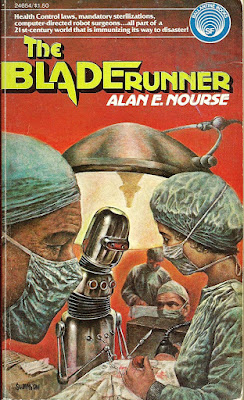Book Review: 'The Bladerunner' by Alan E. Nourse
I first wrote this review in September, 2008 and posted it to amazon.com soon thereafter. It stayed up for a good six or seven (?) years before abruptly being taken down for violating amazon's 'community guidelines'. I never was told why, but I suspect my reference to William Burroughs being a pervert (below) may have been the Trigger.
Anyways..........
‘The Bladerunner’ first was published in hardback in October 1974 by David McKay. A mass-market paperback version (213 pp.) was issued by Ballantine in December 1975, with cover art by Karl Swanson.
Sadly, both the hardcover and paperback versions are long out of print, and have steep asking prices. An eBook edition is available from Prologue Books.
Alan E. Nourse (1928 – 1992) published a sizeable collection of SF short stories and novels, most of which were aimed at juveniles (the term ‘Young Adult’ wasn’t really in use in that era) throughout the 50s, 60s, and early 70s. A physician, Nourse often addressed medical themes in his works.
I well remember purchasing his short story collection ‘The Counterfeit Man’ (1963) as one of the perennial SF titles offered to kids as part of the Scholastic (paperback) Book Club purchasing program. I suspect most of my fellow Baby Boomers also will remember ‘The Counterfeit Man’ from their own childhoods.
‘The Bladerunner’ has a confusing history with regard to its title. A screenplay based on Nourse’s novel, and written by William Burroughs, failed to attract attention from the major studios when shopped in the mid 70’s; subsequently the screenplay was adapted to a novelette and published in 1979 as ‘Blade Runner: A Movie’.
From what I remember from reading 'Blade Runner: A Movie' back in '79, it too-clearly reflected Burroughs’s fixation with pederasty, and even the more ‘progressive’ studio execs probably felt uncomfortable with the thought of catering to the fantasies of a pervert, however great his standing in the literary world.
I’ve no idea if Warner Bros. paid any sort of licensing fee to Nourse or Ballantine / Del Rey for using the title for its 1982 film adaptation of the Philip K. Dick novel ‘Do Androids Dream of Electric Sheep ?’. If not, they certainly should have, because ‘The Bladerunner’ is a good novel in its own right despite having the misfortune to share a title with one of the most influential SF films of the past 50 years.
‘The Bladerunner’ is set in approximately 2015, after the 1994 ‘Health Riots’ marked the economic collapse of the American health care system. Anyone seeking treatment in any facility may find themselves subjected to sterilization under Eugenics Laws designed to reduce the incidence of disease in the population. Unsurprisingly, many elect to have their medical needs met at home using a clandestine system of care performed by idealistic MDs who disagree with the System.
‘Bladerunner’ refers to young men who serve as couriers for contraband drugs and surgical supplies between patients and the doctors, most of whom have entirely legitimate practices in hospitals and clinics in the wealthier sections of the city.
Billy Gimp is one such Bladerunner, working for surgeon ‘Doc’ John Long and his able nurse Molly. The trio sets out several times a week to lower-income neighborhoods of New York and its surrounding environs to conduct kitchen-table tonsillectomies and other surgical procedures. Billy and his companions must be watchful for surveillance by the Big Brother-ish Health Control police, since a conviction for providing black market health care can result in imprisonment for Billy, and the loss of a license for Doc.
When Billy does find himself under surveillance, he quickly learns that it is not unique to his own bladerunning operation, but rather, has expanded to the entire underground medicine infrastructure. Does the increased scrutiny by the authorities have anything to do with the ‘Shanghai Flu’ ? Could the Flu be the start of an epidemic of a new and lethal disease, and his clients in the black market the medical equivalent of canaries in a coal mine ? Can the authorities set aside their ideology to ally with the bladerunners, and stop a catastrophe from snuffing out half of the population of the United States ?
In my opinion ‘The Bladerunner’ is a very readable exemplar of first-generation cyberpunk SF. It shares with the genre the near-future setting, the psychological backdrop of paranoia and alienation from ‘conventional’ society, an urban megalopolis subject to pervasive government oversight, and a sense of the ‘street finding its own use for things’.
Billy Gimp is a prototypical cyberpunk ‘hero’, with his club foot, trashed apartment, and contempt for authority sharpened by a life of deprivation in the grimy alleys of the Lower City. The novel lacks the emphasis on sex, (illegal) drugs, and rock n’ roll found in the cyberpunk Canon (this is a novel intended for young adults, after all), but it serves as a kind of predecessor to ‘Neuromancer’, still a decade away from hitting the bookstore shelves.
And….. I guess it’s just coincidence that there’s a Molly in 'The Bladerunner', and a Molly in 'Neuromancer' ? ….hmmm…























